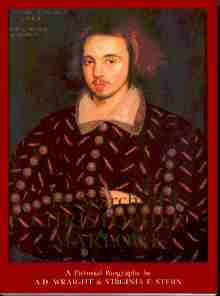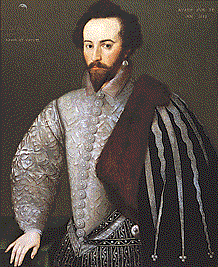Marlowe & Raleigh


 |
 |
Now hast thou but one bare hour to live, And then thou must be damned perpetually. Stand still you ever moving spheres of heaven, That time may cease, and midnight never come; Fair Nature's eye, rise, rise again, and make Perpetual day, or let this hour be but a year, A month, a week, a natural day, That Faustus may repent, and save his soul. O lente, lente, currite noctis equi. The stars move still, time runs, the clock will strike. The devil will come, and Faustus must be damned. O, I'll leap up to my God who pulls me down? See, see where Christ's blood streames in the firmament; One drop would save my soule, half a drop, ah, my Christ! Ah, rend not my heart for naming of my Christ, Yet will I call on him. Oh spare me, Lucifer! Where is it now? 'Tis gone, And see where God Stretcheth out his arm, and bends his ireful brows. Mountains and hills, come, come and fall on me, And hide me from the heavy wrath of God. No no, then will I headlong run into the earth; Earth gape! O no, it will not harbour me. You stars that reigned at my nativity, Whose influence hath allotted death and hell, Now draw up Faustus like a foggy mist, Into the entrails of yon laboring cloud, That when you vomit forth into the air, My limbs may issue from your smoky mouths, So that my soul may but ascend to heaven. Ah, half the hour is past: 'Twill all be past anon. (The watch strikes the half hour) Oh God, if thou wilt not have mercy on my soul, Yet for Christ's sake, whose blood hath ransomed me, Impose some end to my incessant pain; Let Faustus live in hell a thousand years, A hundred thousand, and at last be saved. O, no end is limited to damned souls. Why wert thou not a creature wanting soul? Or why is this immortal that thou hast? Ah, Pythagoras' metempsychosis, were that true, This soul should fly from me, and I be changed Unto some brutish beast. All beasts are happy, for when they die, Their souls are soon dissolved in elements, But mine must live still to be plagued in hell. Curst be the parents that engendered me. No, Faustus, curse thyself, curse Lucifer, That hath deprived thee of the joys of heaven. The clock striketh twelve. O, it strikes, it strikes! Now, body, turn to air, Or Lucifer will bear thee quick to hell. (Thunder and lightning.) O soul, be changed into little water drops, And fall into the ocean, ne'er be found. My God, my God, look not so fierce on me; Enter Devils. Adders, and serpents, let me breathe a while; Ugly hell gape not, come not Lucifer; I'll burn my books! Ah, Mephistophilis. Exeunt Devils with Faustus. |
2) Explain his exclamation "0, I'll leap up to my God! Who pulls me down? / See, see, where Christ's blood streams in the firmament!" 3) What does Faustus request of the stars in lines 25-31? 4) Paraphrase lines 40-46. 5) Analyze Marlowe's poetic technique in the excerpt. How does he convey Faustus's terror and despair? |
And we will all the pleasures prove That valleys, groves, hills, and fields, Woods or steepy mountain yields.
And we will sit upon the rocks,
And I will make thee beds of roses
A gown made of the finest wool
A belt of straw and ivy buds,
The shepherds' swains shall dance and sing |
2) How realistic is his representation of the kind of life he and his love will lead? Explain. 3) If a poet of today were to write a contemporary version of this poem, how might the details differ from Marlowe's? |
And truth in every shepherd's tongue, These pretty pleasures might me move To live with thee and be thy love. Time drives the flocks from field to fold, The flowers do fade, and wanton fields Thy gowns, thy shoes, thy beds of roses, Thy belt of straw and ivy buds, But could youth last and love still breed, |
2) How does the speaker first suggest that the shepherd may be making unrealistic promises? 3) What does the speaker think about the gifts being offered her in the previous poem? 4) Under what circumstances might the speaker accept the shepherd's offer? 5) In what ways does the form of Raleigh's poem resemble that of Marlowe's? |
And flourish, whilst they grow asunder far; But on a day, they meet all in one place, And when they meet they one another mar: And they be these: the wood, the weed, the wag. The wood is that which makes the gallow tree; The weed is that which strings the hangman's bag; The wag, my pretty knave, betokeneth thee. Mark well, dear boy, whilst these assemble not, Green springs the tree, hemp grows, the wag is wild, But when they meet, it makes the timber rot; It frets the halter, and it chokes the child. Then bless thee, and beware, and let us pray We part not with thee at this meeting day. |
2) What happens when the wood, the weed, and the wag meet? 3) Who is the wag in the poem? 4) What is the speaker's main concern? 5) Given the speaker's concern, what conclusion can you draw about the behavior of the speaker's son? Explain. 6) How would you describe the poem's tone? |